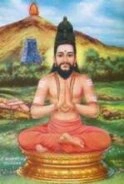

திரு அருணகிரிநாதர் அருளிய
திருப்புகழ்
Sri AruNagirinAthar's
Thiruppugazh

 |  திரு அருணகிரிநாதர் அருளிய Sri AruNagirinAthar's |  |
|---|
| (இந்த வலைத்தளத்தைப் பயன்படுத்துவதற்கு முன்பு எனது முக்கியக் குறிப்பைப் படியுங்கள் - நன்றி). (Please read my important note before using this website - Thank You). |
| திருப்புகழ் 514 முத்த மோகன (சிதம்பரம்) Thiruppugazh 514 muththamOgana (chidhambaram) |
 |  | தமிழிலும் ஆங்கிலத்திலும் பொருள் எழுதியது ஸ்ரீ கோபால சுந்தரம் Meanings in Tamil and English by Sri Gopala Sundaram | English PDF அமைப்பு in PDF | ஆலய வரிசை அகரவரிசை எண்வரிசை தேடல் venue list alphabetical numerical search |
|
தத்த தானன தத்தன தானன தத்த தானன தத்தன தானன தத்த தானன தத்தன தானன ...... தனதான ......... பாடல் ......... முத்த மோகன தத்தையி னார்குர லொத்த வாயித சர்க்கரை யார்நகை முத்து வாரணி பொற்குவ டார்முலை ...... விலைமாதர் மொக்கை போகசெ குத்திடு வார்பொருள் பற்றி வேறும ழைத்திடு வார்சிலர் முச்ச லீலிகை சொக்கிடு வாரிடர் ...... கலிசூழச் சித்தி லாடஅ ழைத்திடு வார்கவ டுற்ற மாதர்வ லைப்புகு நாயெனை சித்தி ஞானம்வெ ளிப்பட வேசுடர் ...... மடமீதே சித்தெ லாமொரு மித்துன தாறினம் வைத்து நாயென ருட்பெற வேபொருள் செப்பி யாறுமு கப்பரி வோடுணர் ...... வருள்வாயே தத்த னானத னத்தன தானெனு டுக்கை பேரிமு ழக்கிட வேகடல் சத்த தீவுத யித்தியர் மாளிட ...... விடும்வேலா சத்தி லோகப ரப்பர மேசுர நிர்த்த மாடுக ழற்கரு ணாகர தற்ப ராபர நித்தனொர் பாலுறை ...... யுமைபாலா துத்தி மார்முலை முத்தணி மோகன பொற்ப்ர காசமு ளக்குற மான்மகள் துப்பு வாயிதழ் வைத்தணை சோதிபொன் ...... மணிமார்பா சுட்டி நீலஇ ரத்தின மாமயி லுற்று மேவிய ருட்புலி யூர்வளர் சுத்த னேசசி பெற்றபெ ணாயகி ...... பெருமாளே. ......... சொல் விளக்கம் ......... முத்த(ம்) மோகன(ம்) தத்தையினார் குரல் ஒத்த வாய் இத சர்க்கரையார் ... முத்தம் தந்து காம மயக்கத்தைத் தருகின்ற கிளி போன்றவர்கள். (கிளி போன்ற) குரலைக் கொண்ட வாயினின்றும் இனிய சர்க்கரை போன்ற மொழியினர். நகை முத்து வார் அணி பொன் குவடு ஆர் முலை விலைமாதர் மொக்கை போக செகுத்திடுவார் ... முத்தைப் போன்ற பற்கள் உடையவர். கச்சு அணிந்த அழகிய மலை போன்ற மார்பகங்களை உடைய பொது மகளிர். மதிப்பை இழக்கும்படி அழிப்பவர்கள். பொருள் பற்றி வேறும் அழைத்திடுவார் சிலர் முச் சலீலிகை சொக்கிடுவார் இடர் கலி சூழச் சித்தில் ஆட அழைத்திடுவார் ... பொருள் காரணமாக வேறு ஆடவர்களையும் அழைப்பவர்கள். சிலர் வாய் நீர், சிறு நீர், நாத நீர் ஆகிய மூன்று நீர்கள் சம்பந்தப்பட்ட சொக்கு மருந்தைக் கொடுப்பவர்கள். துன்பமும் தரித்திரமும் சூழத் தொடர மாய வித்தைகள் ஆடி அழைப்பவர்கள். கவடு உற்ற மாதர் வலைப் புகு நாயெனை சித்தி ஞானம் வெளிப்படவே சுடர் மட(ம்)* மீதே சித்தி எ(ல்)லாம் ஒருமித்து ... வஞ்சனை கொண்ட விலைமாதர்களின் வலையில் புகுகின்ற அடியேனுக்கு அஷ்டமா சித்திகளும்** நல்ல அறிவும் தோன்ற, (நந்தி) ஒளி காணப்படும் (லலாட)* புருவ நடுநிலையில், அறிவு எல்லாம் ஒன்று கூடி அமைந்துள்ள உனது ஆறு இனம் வைத்து நாயென் அருள் பெறவே பொருள் செப்பி ஆறுமுகப் பரிவோடு உணர்வு அருள்வாயே ... உன்னுடைய ஆறு எழுத்தை முறைப்படி வைத்து, அடியேன் உன் திருவருளைப் பெறுமாறு (அந்த ஆறெழுத்தின்) பொருளை விளக்கிச் சொல்லி, உனது திருமுகங்கள் ஆறும்*** கருணை கொண்டவனாய் ஞானத்தை அருள்வாயாக. தத்த னானத னத்தன தா எனு(ம்) உடுக்கை பேரி முழக்கிடவே கடல் சத்த தீவு தயித்தியர் மாளிட விடும் வேலா ... தத்த னானத னத்தனதா இவ்வாறான ஒலிகளை உடுக்கையும் பேரிகைகளும் பேரொலி செய்ய, கடல் சூழ்ந்த ஏழு தீவுகளிலும் இருந்த அசுரர்கள் இறந்து போகும்படியாக வேலைச் செலுத்தியவனே, சத்தி லோக பரப் பரமேசுர நிர்த்தம் ஆடு கழல் கருணாகர தற்பரா பர நித்தன ஒர் பால் உறை உமை பாலா ... அருள் சக்தி உலகங்களுக்கு எல்லாம் முழு முதற் கடவுளாய், பரம ஈசுவரனாய், நடனம் ஆடுகின்ற திருவடிகளை உடைய கருணாகரனாய், தாமே பரம் பொருளாய், அழியாதவராய் உள்ள சிவபெருமானுடைய இடது பக்கத்தில் உள்ள உமா தேவியின் குழந்தையே, துத்தி மார் முலை முத்து அணி மோகன பொன் ப்ரகாசம் உளக் குற மான் மகள் துப்பு வாய் இதழ் வைத்து அணை சோதி பொன் மணி மார்பா ... தேமல் படர்ந்துள்ள மார்பகத்தின் மீது முத்து மாலை அணிந்துள்ள, அழகும் பொலிவுள்ள ஒளியும் கொண்டுள்ள, மான் பெற்ற குறப் பெண்ணாகிய வள்ளியின் பவளம் போலச் சிவந்துள்ள வாயிதழ் ஊறலைப் பருகி அவளைத் தழுவும், ஒளி வீசும் அழகிய மணிகள் அணிந்துள்ள மார்பனே, சுட்டி நீல இரத்தின மா மயில் உற்று மேவிய அருள் புலியூர் வளர் சுத்தனே சசி பெற்ற பெண் நாயகி பெருமாளே. ... நீலக் கொண்டையும், நீல நிறமும், ரத்தின ஒளியும் கொண்டுள்ள சிறந்த மயில் மீது பொருந்தி அமர்ந்து சிதம்பரத்தில் வீறுடன் விளங்கும் சுத்த மூர்த்தியே, இந்திராணி பெற்ற தேவயானையாகிய நாயகியின் பெருமாளே. |
* சுடர் ம(மா)டம் - நந்தி ஒளி காணும் லலாடஸ்தானம் ஆகும். புருவ மத்தியைக் குறிக்கும். இங்கு 'சுழுமுனை', 'இடைகலை', 'பிங்கலை' ஆகிய மூன்று நாடிகளும் கூடுவதால் பிரகாசமான மண்டபம் தோன்றும். |
இங்கு சிவயோக முறைகள் விளக்கப்பட்டுள்ளன. அதன் சுருக்கம் வருமாறு: நாம் உள்ளுக்கு இழுக்கும் காற்றுக்குப் 'பூரகம்' என்றும், வெளிவிடும் காற்றுக்கு 'ரேசகம்' என்றும் பெயர். உள்ளே நிறுத்திவைக்கப்படும் காற்றுக்கு 'கும்பகம்' என்று பெயர். உட் கொள்ளும் பிராணவாயு உடலில் குறிப்பிட்ட 'ஆதாரங்கள்' (நிலைகள், சக்கரங்கள்) மூலமாகப் படிப்படியாகப் பரவி, மேல் நோக்கிச் சென்று, தலையில் 'பிரம கபால'த்தில் உள்ள 'ஸஹஸ்ராரம்' (பிந்து சக்கரம்) என்ற சக்கரத்துக்குச் செல்லும். இந்த ஐக்கியம் ஏற்படும்போது, அமுத சக்தி பிறந்து, ஆறு ஆதாரங்களுக்கும் ஊட்டப்பட்டு, மீண்டும் அதே வழியில் 'மூலாதார'த்தை வந்து அடையும். இந்த ஆதாரங்களை ஒழுங்கு படுத்தும் வகையில் மூன்று 'மண்டல'ங்களும் (அக்கினி, ஆதித்த, சந்திர மண்டலங்கள்), பத்து 'நாடி'களும் (இடைகலை, பிங்கலை, சுழுமுனை முதலியன) உள்ளன. 'இடைகலை' பத்து நாடிகளுள் ஒன்று. இடது நாசியால் விடும் சுவாசம். 'பிங்கலை' பத்து நாடிகளுள் ஒன்று. வலது நாசி வழியால் விடும் சுவாசம். 'சுழு முனை' இடைகலைக்கும் பிங்கலைக்கும் இடையில் உள்ளது. 'சுழு முனை' ஆதாரம் ஆறிலும் ஊடுருவி நிற்பது. 'இடைகலை'யும், 'பிங்கலை'யும் ஒன்றுக்கொன்று பின்னி நிற்பன. சுவாச நடப்பை 'ப்ராணாயாமம்' என்ற யோக வன்மையால் கட்டுப்படுத்தினால் மன அமைதி ஏற்படும். |
ஆதாரங்களின் பெயர்களும், உடலில் இருக்கும் இடம், உரிய ஐம்பூதங்கள், அனுட்டிக்கும்போது மலர் வடிவங்களின் அமைப்பு, அக்ஷரக் குறிப்பு ஆகியவை கீழே தரப்பட்டுள்ளன. மேலும் இந்த ஆதாரங்களுக்கு உரிய தலங்கள், கடவுளர்கள் பெயர்களும் கொடுக்கப்பட்டுள்ளன. | ||||||
| ஆதாரம் மூலாதாரம் சுவாதிஷ்டானம் மணிபூரகம் அநாகதம் விசுத்தி ஆக்ஞா பிந்து சக்கரம் (துவாதசாந்தம், ஸஹஸ்ராரம், பிரமரந்திரம்) | இடம் குதம் கொப்பூழ் மேல்வயிறு இருதயம் கண்டம் புருவத்தின் நடு கபாலத்தின் மேலே | பூதம் மண் அக்கினி நீர் காற்று ஆகாயம் மனம் | வடிவம் 4 இதழ் கமலம் முக்கோணம் 6 இதழ் கமலம் லிங்கபீடம் நாற் சதுரம் 10 இதழ் கமலம் பெட்டிப்பாம்பு நடு வட்டம் 12 இதழ் கமலம் முக்கோணம் கமல வட்டம் 16 இதழ் கமலம் ஆறு கோணம் நடு வட்டம் 3 இதழ் கமலம் 1008 இதழ் கமலம் | அக்ஷரம் ஓம் ந(கரம்) ம(கரம்) சி(கரம்) வ(கரம்) ய(கரம்) | தலம் திருவாரூர் திருவானைக்கா திரு(வ) அண்ணாமலை சிதம்பரம் திருக்காளத்தி காசி (வாரணாசி) திருக்கயிலை | கடவுள் விநாயகர் பிரமன் திருமால் ருத்திரன் மகேசுரன் சதாசிவன் சிவ . சக்தி ஐக்கியம் |
** அஷ்டமாசித்திகள் பின்வருமாறு: அணிமா - அணுவிலும் சிறிய உருவினன் ஆதல். மகிமா - மேருவினும் பெரிய உருவினன் ஆதல். கரிமா - ஆயுதங்களுக்கும், ஆகாயத்துக்கும், காலத்துக்கும் அப்பால் ஆதல். லகிமா - ஆகாயகமனம், அந்தரத்தில் இருத்தல். பிராப்தி - பர காயங்களில் புகுதல் (கூடுவிட்டு கூடுபாய்தல்). பிராகாமியம் - எல்லாவற்றிலும் நிறைந்திருத்தல். ஈசத்துவம் - எல்லாவற்றுக்கும் நாதனாக இருத்தல். வசித்துவம் - எல்லா இடங்களிலும் இருந்து யாவற்றையும் வசப்படுத்தல். |
*** ஆறு முகத்தின் தத்துவம் பின்வருமாறு: சக்திகள் ஆறு - ஆதி சக்தி, இச்சா சக்தி, க்ரியா சக்தி, ஞான சக்தி, பராசக்தி, குடிலா (ஓங்கார) சக்தி. பீஜங்கள் ஆறு - அகரம், உகரம், மகரம், நாதம், விந்து, கலை. அத்துவாக்கள் ஆறு - மந்திரம், பதம், வண்ணம், புவனம், கலை, தத்துவம். இறைக் குணங்கள் ஆறு: ஸர்வக்ஞத சக்தி - பூரண அறிவுடன் இருக்கும். நித்ய திருப்தி சக்தி - எல்லா அனுக்ரகமும் புரியும். அநாதிபோத சக்தி - எல்லா உயிர்களுக்கும் ஞானத்தைத் தரும். ஸர்வ சுதந்திர சக்தி - ஆன்மாக்களுக்கு முக்தியைத் தரும். அலுப்த சக்தி - ஐந்தொழிலைப் புரியும். அநந்த சக்தி - எல்லா ஆற்றலையும் உண்டாக்கும். குணங்கள் ஆறு - ஐசுவரியம், வீரியம், புகழ், திரு, ஞானம், வைராக்கியம். |
ஆறு முகங்களைப் பற்றி அருணகிரிநாதர் அருளிச் செய்த பாடல்: ஏறுமயில் ஏறி |
| 'wikisource' reference links for this song இப்பாடலுக்கான 'விக்கிமூலம்' இணையப் பக்கங்கள் pg 2.549 pg 2.550 pg 2.551 pg 2.552 WIKI_urai Song number: 654 goto wiki alpha list (Please note: Kaumaram.com is NOT responsible for accuracy and contents of external links) |
| மன்னிக்கவும், இப்பாடலுக்கு ஒலிப்பதிவுகள் இல்லை Sorry, no audio recordings for this song |
(Please note: Kaumaram.com is NOT responsible for accuracy and contents of external links) top |
|
Song 514 - muththa mOgana (chidhambaram) muththa mOkana thaththaiyi nArkura loththa vAyitha sarkkarai yArnakai muththu vAraNi poRkuva dArmulai ...... vilaimAthar mokkai pOkase kuththidu vArporuL patRi vERuma zhaiththidu vArsilar muccha leelikai sokkidu vAridar ...... kalacUzhac chiththi lAdA zhaiththidu vArkava dutRa mAtharva laippuku nAyenai siththi njAnamve Lippada vEsudar ...... madameethE siththe lAmoru miththuna thARinam vaiththu nAyena rutpeRa vEporuL seppi yARumu kappari vOduNar ...... varuLvAyE thaththa nAnatha naththana thAnenu dukkai pErimu zhakkida vEkadal saththa theevutha yiththiyar mALida ...... vidumvElA saththi lOkapa rappara mEsura nirththa mAduka zhaRkaru NAkara thaRpa rApara niththanor pAluRai ...... yumaipAlA thuththi mArmulai muththaNi mOkana poRpra kAsamu LakkuRa mAnmakaL thuppu vAyithazh vaiththaNai sOthipon ...... maNimArpA sutti neelai raththina mAmayi lutRu mEviya rutpuli yUrvaLar suththa nEsasi petRape NAyaki ...... perumALE. ......... Meaning ......... muththa(m) mOkana(m) thaththaiyinAr kural oththa vAy itha sarkkaraiyAr: These parrot-like women shower kisses and provoke passionate delusion. They have a voice like that of a parrot, and the speech from their mouth is sweet like sugar. nakai muththu vAr aNi pon kuvadu Ar mulai vilai mAthar mokkai pOka sekuththiduvAr: Their teeth are like pearls. They cover their mountain-like bosom with tight blouse. They demolish their suitor's esteem. poruL patRi vERum azhaiththiduvAr silar muc chaleelikai sokkiduvAr idar kali cUzhac chiththil Ada azhaiththiduvAr: For the sake of money, they invite other men too. Some of them administer a toxic potion mixed with three kinds of fluids (saliva, urine and menstrual discharge) to entice men. Making men suffer from misery and poverty, they play many a mystical trick and attract them. kavadu utRa mAthar valaip puku nAyenai siththi njAnam veLippadavE sudar mada(m)* meethE siththi e(l)lAm orumiththu: I am the miserable one entering the net of these treacherous whores; granting me the (ashtamA siddhis) eight great occult powers* and making me realise the wisdom between my eye-brows** where the cosmic light dazzles as a culmination of all knowledge; unathu ARu inam vaiththu nAyen aruL peRavE poruL seppi ARumukap parivOdu uNarvu aruLvAyE: placing the six holy letters of Your name in series and explaining to me the significance of each such letter so that I am blessed with Your grace, kindly grant me True Knowledge from all Your six*** compassionate and hallowed faces, Oh Lord! thaththa nAnatha naththana thA enu(m) udukkai pEri muzhakkidavE kadal saththa theevu thayiththiyar mALida vidum vElA: As the hand-drums and large drums made the noise to the meter "thaththa nAnatha naththana thA", the demons living in the seven islands surrounded by the seas perished when You wielded the spear, Oh Lord! saththi lOka parap paramEsura nirththam Adu kazhal karuNAkara thaRparA para niththana or pAl uRai umai pAlA: He is the Primordial God of all the worlds created by ParAsakthi (Goddess PArvathi); He is the Supreme Almighty; He is the compassionate One who has dancing feet; He is the Ultimate Principle; He is immortal; on the left side of that Lord SivA, She is concorporate; and You are the child of that UmAdEvi, Oh Lord! thuththi mAr mulai muththu aNi mOkana pon prakAsam uLak kuRa mAn makaL thuppu vAy ithazh vaiththu aNai sOthi pon maNi mArpA: On Her yellow-stained bosom She wears a string of pearls; She is beautiful, glowing with grace; She is the damsel of the KuRavAs, born to a deer; imbibing the saliva oozing from the coral-red lips of that VaLLi, You hug Her with Your broad chest adorned with bright and lovely gems, Oh Lord! sutti neela iraththina mA mayil utRu mEviya aruL puliyUr vaLar suththanE sasi petRa peN nAyaki perumALE.: You elegantly mount the famous peacock with a blue crest, blue complexion and gem-like brightness and take Your seat majestically in Chidhambaram, Oh Pristine Lord! You are the Consort of DEvayAnai, the daughter of IndirANi, Oh Great One! |
sudar ma(mA)dam: The centre of the eyebrows where the light of wisdom is seen. |
In this song, several Siva-yOgA principles are explained: The inhaled air is known as 'pUragam' and the exhaled air is 'rechagam'. The retained air is 'kumbagam'. The oxygen that enters the body climbs up step by step through several centres, known as 'chakrAs' and ultimately reaches 'sahasrAram' or 'bindhuchakram' on the top of the skull. At that point of union, nectar flows from that chakrA and seeps through and soaks the six centres of the body and returns to the basic chakrA, 'mUlAthAram'. Three zones (namely, the sun zone, the moon zone and the fire zone) and ten nerves ('nAdis') govern the six centres; the principal nerves are 'susumna', 'idaikala' and 'pingala'. idakala: one of the ten 'nAdis' (nerves), when inhalation takes place through the left nostril; pingala: one of the ten 'nAdis' (nerves), when inhalation takes place through the right nostril; susumna: one of the ten 'nAdis' (nerves), situated between the above two 'nadis', and running through the spinal chord covering all the six centres of 'kundalini'. ('idakala' and 'pingala' are entwined around 'susumna'). If breathing is controlled through a yOgA called 'praNAyAmA', the mind becomes tranquil. |
The names of the chakrA centres, the deities, the elements, the zones of the body where they are located, the shape of the chakrAs, the description of the flowers in the chakrAs, the letters of the ManthrA governing them and the temple-towns representing them are given in the following chart: | ||||||
| ChakrA mUlAthAram swAthishtAnam maNipUragam anAgatham visudhdhi AgnyA Bindu chakkaram (DhwAdhasAntham, SahasrAram, Brahma-ranthiram) | Body Zone Genitals Belly-button Upper belly Heart Throat Between the eyebrows Over the skull | Element Earth Fire Water Air Sky Mind | Shape 4-petal lotus Triangle 6-petal lotus Lingam Square 10-petal lotus cobra in box central circle 12-petal lotus Triangle lotus circle 16-petal lotus Hexagon central circle 3-petal lotus 1008-petal lotus | Letter Om na ma si va ya | Temple ThiruvArUr ThiruvAnaikkA Thiru aNNAmalai Chidhambaram ThirukkALaththi VaranAsi (kAsi) Mt. KailAsh | Deity VinAyagar BrahmA Vishnu RUdhran MahEswaran SathAsivan Siva-Sakthi Union |
** Eight Primary Siddhis (occult powers): aNima: reducing one's body to even less than the size of an atom; mahima: expanding one's body to an infinitely large size; garima: becoming infinitely heavy; laghima: becoming almost weightless; prApti: having unrestricted access to all bodies and places; prAkAmya: realising success everywhere; eesatva: possessing absolute lordship; vasitva: the power to subjugate all. |
*** The significance of the six hallowed faces of Murugan: Six kinds of (Sakthis) Energies: Primal sakthi, Sakthi of Desire, Sakthi of Creation, Sakthi of Knowledge, the Supreme Sakthi, Kudila (OmkAra) Sakthi; Six Sacred Seeds: akaram, ukaram, makaram, nAtham, vinthu, kalai; Six famous bases: manthiram, patham, vaNNam, puvanam, kalai, thaththuvam; Six Divine Characteristics: Sarvaknjatha sakthi: Omniscience; nithya thirupthi sakthi: Bestowing gracious boons on all; anAthipOtha sakthi: Making all lives intelligent; Sarva suthanthira sakthi: Granting liberation to all lives; aluptha sakthi: Performing five major cosmic tasks, namely, creation, protection, destruction, concealment and compassion; anantha sakthi: Omnipotence; Six (human) Characteristics: Divinity, Valour, Repute, Wealth, Knowledge and Determination. The famous Song on the six hallowed faces of Murugan by AruNagirinAthar: ERumayil ERi |
| தமிழில் PDF அமைப்பு ஆலய வரிசை அகரவரிசை எண்வரிசை |
| ... https://kaumaram.com ... The website for Lord Murugan and His Devotees முகப்பு அட்டவணை மேலே home contents top |
Kaumaram.com is a non-commercial website. This website is a dedication of Love for Lord Murugan. PLEASE do not ask me for songs about other deities or for BOOKS - This is NOT a bookshop - sorry. Please take note that Kaumaram.com DOES NOT solicit any funding, DIRECTLY or INDIRECTLY. © Copyright Kaumaram dot com - 2001-2040 COMMERCIAL USE OF MATERIAL IN THIS WEBSITE IS NOT PERMITTED. Please contact me (the webmaster), if you wish to place a link in your website. email: kaumaram@gmail.com Disclaimer: Although necessary efforts have been taken by me (the webmaster), to keep the items in https://kaumaram.com safe from viruses etc., I am NOT responsible for any damage caused by use of and/or downloading of any item from this website or from linked external sites. Please use updated ANTI-VIRUS program to rescan all downloaded items from the internet for maximum safety and security. மேலே top |